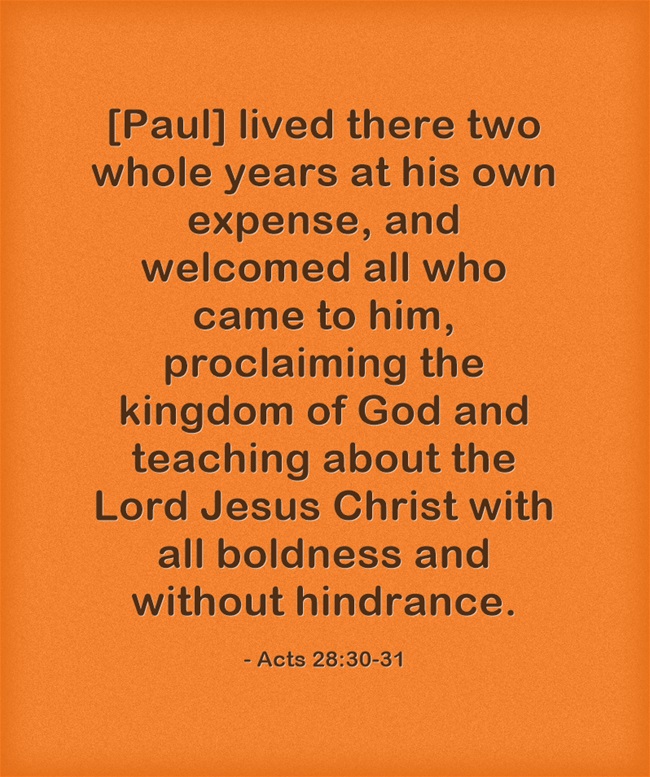How did Christianity come to be the official Church of Rome? Did it end up the same as the first century church?
The First Roman Church
The Apostle Paul was chiefly responsible for the church at Rome, even though it was a church he didn’t plant, but interestingly, Paul did plant the seeds of the church by being chained to a Roman guard. Imagine that! Paul had fresh sets of ears to hear the gospel every shift changed, so many of the Roman guards heard the gospel. The seed had been planted. Most kingdoms come from without and take over, but this kingdom is different. It begins within and will eventually take over the empire itself…or at least, what’s left of the Roman Empire. Later, Paul writes a letter to the church at Rome, perhaps his best of all his books, but this church was already in Rome, long before Rome would be in the church. That first church in Rome was very much like it was in Jerusalem. It is described in Acts 2:42-47 where “they devoted themselves to the apostles’ teaching and the fellowship, to the breaking of bread and the prayers. And awe came upon every soul, and many wonders and signs were being done through the apostles. And all who believed were together and had all things in common. And they were selling their possessions and belongings and distributing the proceeds to all, as any had need. And day by day, attending the temple together and breaking bread in their homes, they received their food with glad and generous hearts, praising God and having favor with all the people. And the Lord added to their number day by day those who were being saved” (Acts 2:42-47). That is probably very close to the way the church at Rome operated…just like the primitive church of the first century.
Paul’s House Church
Paul also must have impacted many in Rome because he had been a prisoner at Rome, but near the end of the Book of Acts, we read that Paul was probably under house arrest and allowed certain freedoms and privileges and “lived there two whole years at his own expense, and welcomed all who came to him, proclaiming the kingdom of God and teaching about the Lord Jesus Christ with all boldness and without hindrance” (Acts 28:30-31). This means he could come and go as he pleased; otherwise he could not have paid his own expenses. It’s possible he had to be at home by nightfall, but in any event, he was allowed many visitors, and he welcomed everyone who came to him, and it was to this same “everyone,” he proclaimed the kingdom of God, and did so boldly, because he was “without hindrance.” There must have been several thousands who had come to faith by the time Paul was beheaded, so what Paul had begun, would later flourish. Paul’s faithfulness proved fruitful. Some estimate that there were at least a few thousand Christians in Rome by the time the apostles were gone. Paul had planted many seeds, but God gave the increase.
Revolution From Within
As is often the case, the seeds of revolution came from within the nation or empire, but this would not be a violent revolution or overthrow of the government. It would be a revolution of love; one that came from loving others, praying for their enemies, doing good to their persecutors, and giving them the love of God, just as God have us the free gift of eternal life (Rom 6:23), without merit (Eph 2:8-9), and purely with love the motivation (Rom 5:8). We don’t repay evil for evil (Rom 12:17) but “live peaceably with all” (Rom 12:18) and are told, “never avenge yourselves, but leave it to the wrath of God, for it is written, “Vengeance is mine, I will repay, says the Lord” (Rom 12:19), but instead, “if your enemy is hungry, feed him; if he is thirsty, give him something to drink” (Rom12:20a). That is what Jesus taught (Matt 5) and what can transform the culture, but the transformation begins within each individual who shares this precious pearl with another and they in turn tell others. Believers were taught that they are to obey those in authority and honor them, regardless of whether they deserve it or not (Rom 13:1-7). They were model citizens and loving those who often persecuted them. In this way, their rejoicing in suffering was like an evangelistic sermon to those around them, including those in authority.
Christianity Grows
As the Roman Empire crumbled, it was divided into smaller domains, but the Christian church continued to grow. By the time the Constantine Dynasty arrived, around 306 AD, the different emperors were fighting among themselves for domination. Constantine fought a series of civil wars against the emperors Maxentius and Licinius and sought to unit all the other empires. Constantine did win a great battle, including victory over his own brother-in-law, Maxentius, who was the co-emperor in the west. Constantine wasn’t told by God to win this battle for the Lord. There is no real evidence that he received a vision from God. The fact is Constantine had been a worshipper of the Sun God, Sol Invictus, even though he began to be more interested in Christianity, however this was not Christian in origin and Constantine still didn’t appear to have a personal relationship with Jesus Christ. He just liked “religion.” Does someone who executes their own son (Crispus) and wife (Fausta) in a very sinful way, and for no cause worthy of death, sound like someone who is a Christ follower? By the time that Emperor Theodosius declared the Edict of Thessalonica in 380 AD, the emperor finally made it the Empire’s sole authorized religion, but again, was this the original church? Was it the church that Jesus Christ founded? Some of the fruit makes you wonder. That is at least how “Christianity” became the official religion of Rome.
Conclusion
By the time Christianity became the official religion of Rome, the religion had seemed to change; at least in practice, but the empire was already “Christian” more than they thought because there were already thousands upon thousands of Christians scattered around the former Roman Empire by now, so it was largely Christian by the time Constantine or Theodosius ever showed up. Besides, Christianity is not really about religion; it’s about a relationship, and having a saving relationship with Jesus Christ by repenting of your sins and trusting in Him.
Article by Jack Wellman
Jack Wellman is Pastor of the Mulvane Brethren Church in Mulvane Kansas. Jack is also the Senior Writer at What Christians Want To Know whose mission is to equip, encourage, and energize Christians and to address questions about the believer’s daily walk with God and the Bible. You can follow Jack on Google Plus or check out his book Teaching Children the Gospel available on Amazon.





